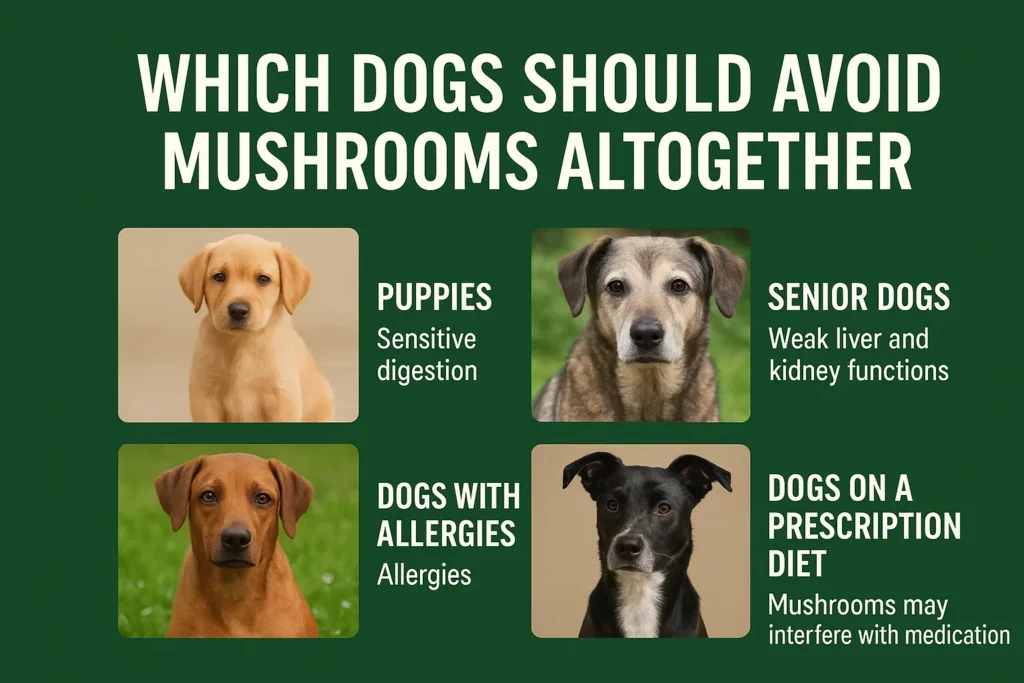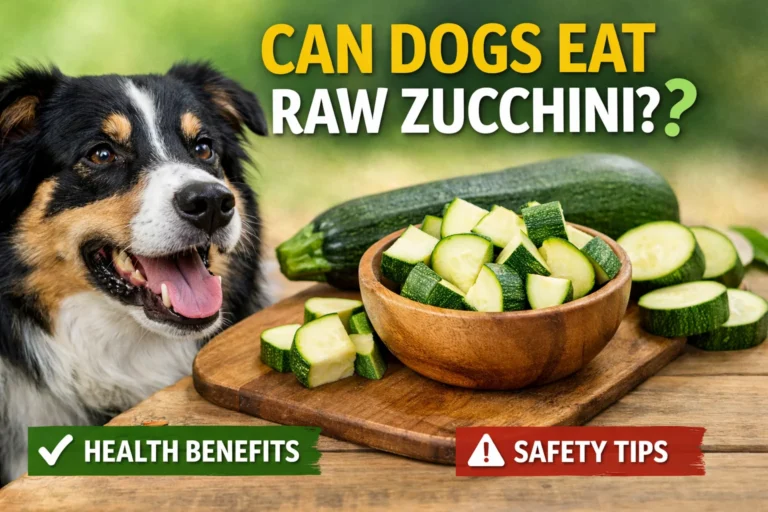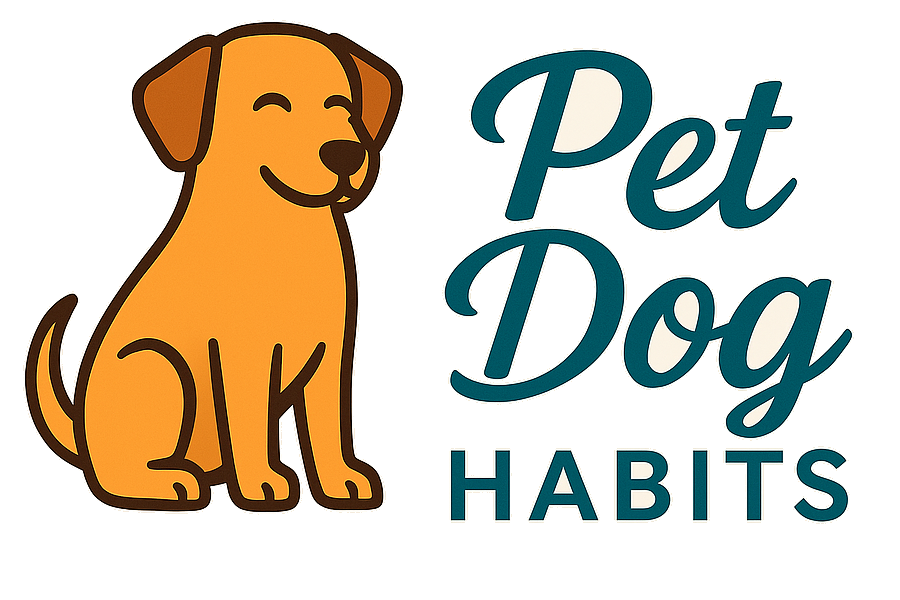Can Dogs Have Mushrooms? The Complete Safety & Nutrition Guide

Introduction
Mushrooms are a common part of human diets, often praised for their unique flavor and nutritional benefits. But when it comes to dogs, many pet owners pause and ask: Can dogs have mushrooms? The answer isn’t a simple yes or no. While some mushrooms are completely safe and even beneficial for dogs, others can be highly toxic—even deadly.
In this comprehensive guide, we’ll explore which mushrooms are safe, which ones to avoid, what symptoms to watch for, and exactly what steps to take if your dog eats a mushroom. This article combines veterinary advice, nutritional insights, and practical prevention tips—so you can confidently keep your furry friend safe.
Safe Mushrooms for Dogs (Store-Bought Only)
Not all mushrooms are dangerous. Many of the same edible mushrooms that humans enjoy are safe for dogs—when given in moderation and prepared correctly.
Safe store-bought mushrooms include:
- Button mushrooms (white mushrooms)
- Cremini mushrooms
- Portobello mushrooms
- Shiitake mushrooms
- Porcini mushrooms
- Baby bella mushrooms
Nutritional benefits of edible mushrooms:
| Nutrient | Benefit for Dogs |
|---|---|
| Vitamin D | Supports bone strength & immune system |
| Antioxidants (selenium, ergothioneine) | Helps fight oxidative stress |
| B Vitamins (B2, B3, B5) | Improves metabolism & energy |
| Fiber | Supports healthy digestion |
| Potassium | Regulates muscles & nerves |
According to PetMD, plain store-bought mushrooms can safely be included in small amounts as an occasional treat, as long as they’re not seasoned or cooked in butter, garlic, onions, or oils that may upset a dog’s stomach.
Feeding tip: Keep mushroom treats to less than 10% of your dog’s daily diet.
Why Wild Mushrooms Are Dangerous
Wild mushrooms are unpredictable and can be extremely toxic. Even experienced mushroom foragers sometimes struggle to distinguish between edible and poisonous species. For dogs, a single bite of the wrong mushroom could result in severe illness or even death.
Common toxic wild mushrooms include:
- Amanita phalloides (Death Cap) – Causes fatal liver failure.
- Amanita muscaria (Fly Agaric) – Triggers neurological symptoms like tremors, hallucinations, and seizures.
- Galerina species – Highly toxic to the liver.
- Inocybe & Clitocybe species – Causes dangerous drooling, diarrhea, and seizures.
The AKC warns that mushroom toxicity in dogs is a true emergency; owners should never wait for symptoms to appear before taking action.
Symptoms of Mushroom Poisoning in Dogs
Mushroom poisoning can affect different parts of the body depending on the species ingested. Symptoms may appear within minutes—or sometimes several hours—after ingestion.
Gastrointestinal symptoms:
- Vomiting
- Diarrhea (sometimes bloody)
- Excessive drooling
- Abdominal pain
Neurological symptoms:
- Tremors
- Disorientation
- Seizures
- Uncoordinated walking
Organ damage symptoms:
- Yellowing of eyes and gums (jaundice → liver failure)
- Extreme thirst or urination (kidney damage)
- Lethargy and collapse
According to The Spruce Pets, even if symptoms seem mild, mushroom ingestion can progress quickly. Immediate veterinary care is always the safest step.
What to Do If Your Dog Eats a Wild Mushroom
If you suspect your dog has eaten a wild mushroom:
- Stay calm and act fast.
- Do NOT wait for symptoms. Mushroom toxins work quickly.
- Collect a sample of the mushroom. Use gloves, place it in a paper bag (not plastic). This helps your vet identify the species.
- Call your veterinarian immediately. If after-hours, contact the Pet Poison Helpline (855-764-7661).
- Do not induce vomiting unless instructed by a vet. Some toxins can cause more harm if vomited.
- Take your dog to the vet right away—bring the mushroom sample with you.
PetMD emphasizes that time is critical. The faster the treatment begins, the better the chances of recovery.
Prevention & Training Tips
The best way to protect your dog is prevention:
- Yard inspection: Regularly check and remove mushrooms growing in your backyard.
- Leash on walks: Keep your dog close, especially in damp or wooded areas.
- Teach “Leave it” or “Drop it”: Essential training to stop your dog from grabbing mushrooms outdoors.
- Know high-risk seasons: Mushrooms thrive in wet, humid conditions—extra caution in spring and fall.
The AKC advises that prevention is easier than treatment, so building awareness and good habits is crucial.
Medicinal Mushrooms & Supplements
Some dog owners use medicinal mushroom supplements (like reishi, turkey tail, or maitake) for immune support. While research suggests potential benefits, these should never be given without veterinary guidance.
- Benefits may include: boosted immunity, anti-inflammatory properties, and cancer-fighting compounds.
- Risks: mislabeling, contamination, overdosing.
As noted by AKC, supplements should only be used with professional supervision.
Which Dogs Should Avoid Mushrooms Altogether?

Some dogs are more vulnerable and should avoid mushrooms completely:
- Puppies (sensitive digestion).
- Senior dogs (weaker liver/kidney function).
- Dogs with allergies or chronic illness.
- Dogs on prescription diets—mushrooms may interfere with medications.
Healthier Alternatives to Mushrooms
If you’re looking for safe treats, consider these instead:
- Blueberries
- Carrots
- Green beans
- Pumpkin cubes
- Apple slices (without seeds)
These provide nutrients without the risks mushrooms may carry.
Frequently Asked Questions
Can dogs eat raw mushrooms?
Raw mushrooms are hard to digest and may cause stomach upset. Cooked, plain, store-bought mushrooms are safer.
What if my dog ate a small piece of a wild mushroom?
Even a tiny piece can be toxic. Contact your vet immediately.
Are all wild mushrooms dangerous?
Not all, but because safe vs toxic mushrooms are hard to distinguish, vets recommend treating all wild mushrooms as poisonous.
Can I share mushrooms from my dinner plate?
No—mushrooms cooked with garlic, onions, salt, or butter are unsafe for dogs.
Are medicinal mushroom supplements safe for dogs?
Only under veterinary guidance. Do not give store-bought human supplements to your pet.
Conclusion
So, can dogs have mushrooms? The short answer:
- Yes, but only plain, store-bought mushrooms in moderation.
- No to wild mushrooms—they pose a serious and sometimes fatal risk.
When in doubt, skip mushrooms and choose safer, healthier treats. Prevention, quick action, and vet consultation are your dog’s best protection.
For more expert guidance, you can check resources from AKC, PetMD, and The Spruce Pets.
Tags
What do you think?
Related Articles

Can Dogs Eat Cottage Cheese? A Complete Guide for Pet Owners
Can dogs eat cottage cheese? Cottage cheese can be a safe, protein-rich treat for dogs when served plain and in moderation. This guide explains the

Can Dogs Eat Raw Zucchini? A Complete Guide for Dog Owners
Can dogs eat raw zucchini safely? Raw zucchini is a low-calorie, hydrating vegetable that many dogs can enjoy when served correctly. This guide explains the

Can Dogs Eat Zucchini? A Complete Nutritional Guide
Zucchini is a low-calorie vegetable often found in human diets, but is it safe for dogs? This detailed guide explains whether dogs can eat zucchini,
